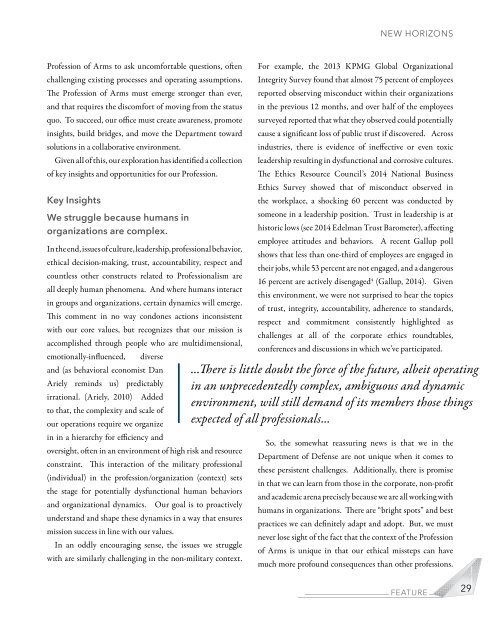PROFESSION OF ARMS
Yi5mwL
Yi5mwL
Create successful ePaper yourself
Turn your PDF publications into a flip-book with our unique Google optimized e-Paper software.
NEW HORIZONS<br />
Profession of Arms to ask uncomfortable questions, often<br />
challenging existing processes and operating assumptions.<br />
The Profession of Arms must emerge stronger than ever,<br />
and that requires the discomfort of moving from the status<br />
quo. To succeed, our office must create awareness, promote<br />
insights, build bridges, and move the Department toward<br />
solutions in a collaborative environment.<br />
Given all of this, our exploration has identified a collection<br />
of key insights and opportunities for our Profession.<br />
Key Insights<br />
We struggle because humans in<br />
organizations are complex.<br />
In the end, issues of culture, leadership, professional behavior,<br />
ethical decision-making, trust, accountability, respect and<br />
countless other constructs related to Professionalism are<br />
all deeply human phenomena. And where humans interact<br />
in groups and organizations, certain dynamics will emerge.<br />
This comment in no way condones actions inconsistent<br />
with our core values, but recognizes that our mission is<br />
accomplished through people who are multidimensional,<br />
emotionally-influenced, diverse<br />
and (as behavioral economist Dan<br />
Ariely reminds us) predictably<br />
irrational. (Ariely, 2010) Added<br />
to that, the complexity and scale of<br />
our operations require we organize<br />
in in a hierarchy for efficiency and<br />
oversight, often in an environment of high risk and resource<br />
constraint. This interaction of the military professional<br />
(individual) in the profession/organization (context) sets<br />
the stage for potentially dysfunctional human behaviors<br />
and organizational dynamics. Our goal is to proactively<br />
understand and shape these dynamics in a way that ensures<br />
mission success in line with our values.<br />
In an oddly encouraging sense, the issues we struggle<br />
with are similarly challenging in the non-military context.<br />
For example, the 2013 KPMG Global Organizational<br />
Integrity Survey found that almost 75 percent of employees<br />
reported observing misconduct within their organizations<br />
in the previous 12 months, and over half of the employees<br />
surveyed reported that what they observed could potentially<br />
cause a significant loss of public trust if discovered. Across<br />
industries, there is evidence of ineffective or even toxic<br />
leadership resulting in dysfunctional and corrosive cultures.<br />
The Ethics Resource Council’s 2014 National Business<br />
Ethics Survey showed that of misconduct observed in<br />
the workplace, a shocking 60 percent was conducted by<br />
someone in a leadership position. Trust in leadership is at<br />
historic lows (see 2014 Edelman Trust Barometer), affecting<br />
employee attitudes and behaviors. A recent Gallup poll<br />
shows that less than one-third of employees are engaged in<br />
their jobs, while 53 percent are not engaged, and a dangerous<br />
16 percent are actively disengaged 4 (Gallup, 2014). Given<br />
this environment, we were not surprised to hear the topics<br />
of trust, integrity, accountability, adherence to standards,<br />
respect and commitment consistently highlighted as<br />
challenges at all of the corporate ethics roundtables,<br />
conferences and discussions in which we’ve participated.<br />
…There is little doubt the force of the future, albeit operating<br />
in an unprecedentedly complex, ambiguous and dynamic<br />
environment, will still demand of its members those things<br />
expected of all professionals…<br />
So, the somewhat reassuring news is that we in the<br />
Department of Defense are not unique when it comes to<br />
these persistent challenges. Additionally, there is promise<br />
in that we can learn from those in the corporate, non-profit<br />
and academic arena precisely because we are all working with<br />
humans in organizations. There are “bright spots” and best<br />
practices we can definitely adapt and adopt. But, we must<br />
never lose sight of the fact that the context of the Profession<br />
of Arms is unique in that our ethical missteps can have<br />
much more profound consequences than other professions.<br />
FEATURE<br />
29


